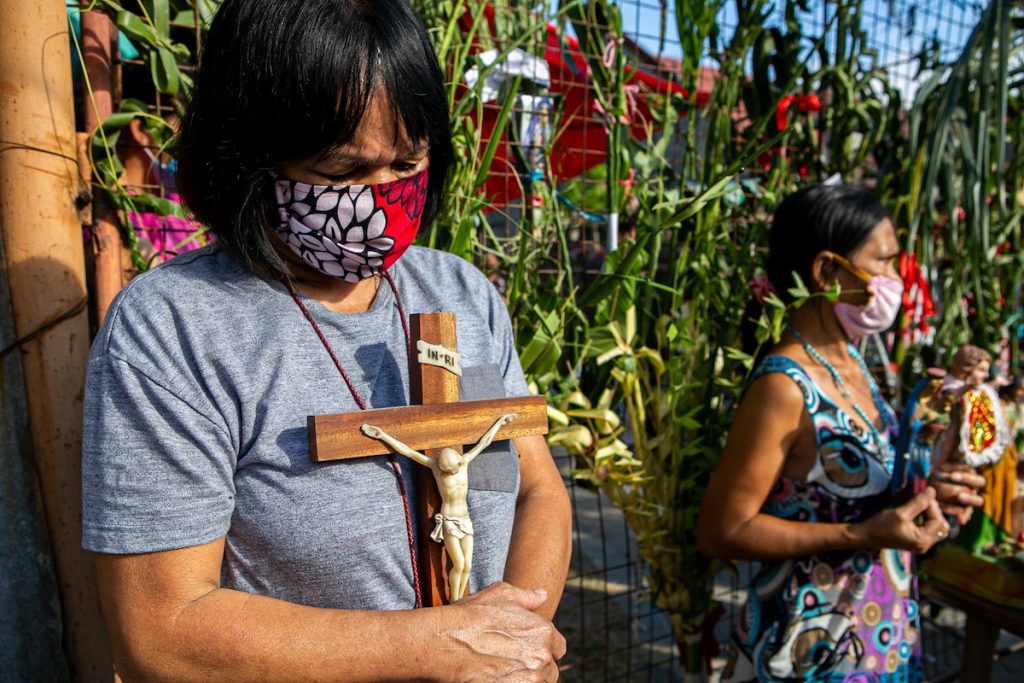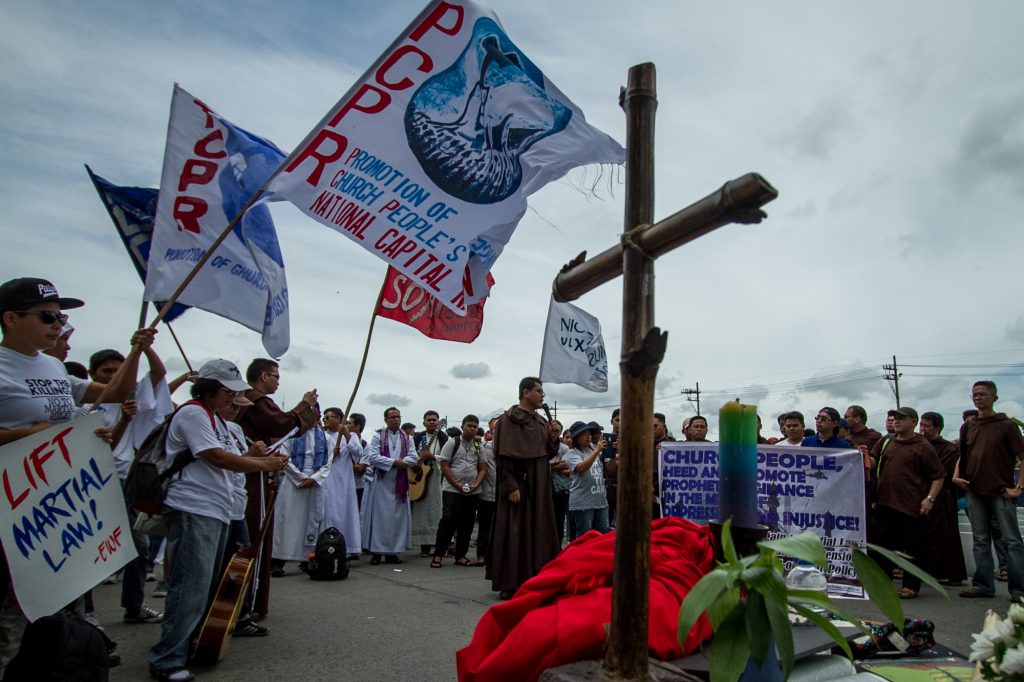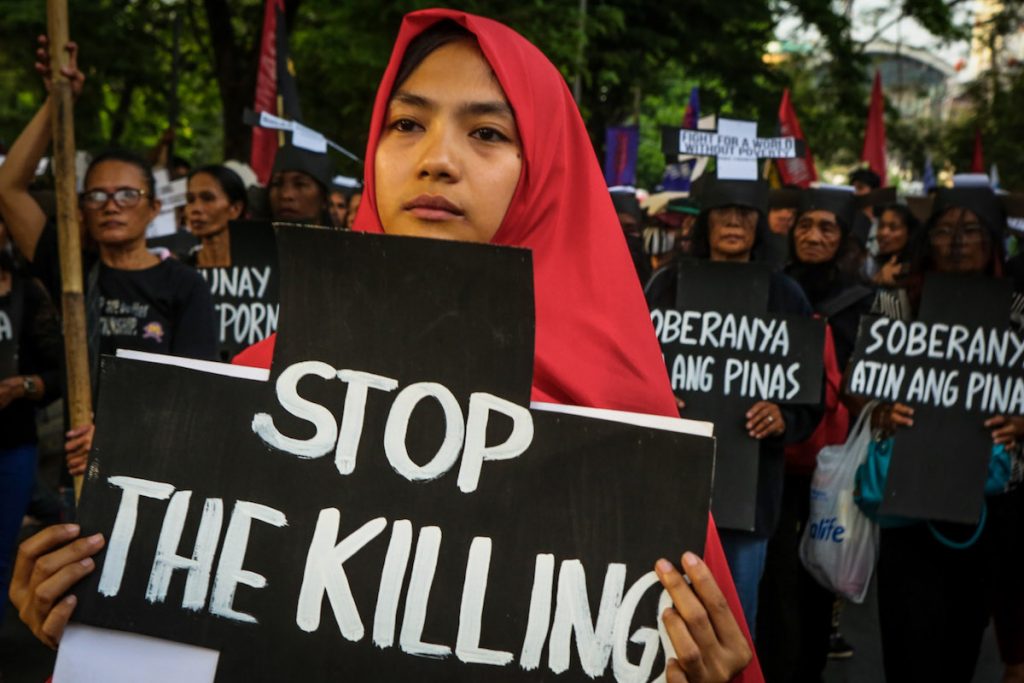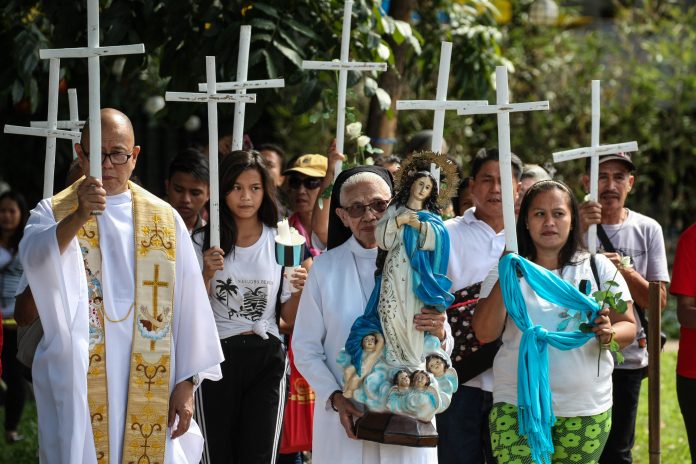As a kid in the early ‘70s, the Roman Catholic celebration of Holy Week, or Mahal na Araw, was perhaps the oddest of all religious traditions to my young mind.
All forms of meat—chicken, pork, beef—were banned in the house beginning Palm Sunday. That weeklong diet of beans and fish each year for a little over five decades took its toll after I reached 50. Arthritis.
Next, regular TV shows got cancelled for a whole week in favor of largely boring religious films, like “The Robe” and “The Ten Commandments.” Yul Brynner as the Pharaoh Ramses resonated more to my young self than Moses played by Charlton Heston. I guess, perhaps, because Ramses seemed to me the underdog.
Third, the world as I knew it stood still on Good Friday for reasons that, as I had been told by my loving grandmother who was an extremely devout Catholic, “God is dead.” I was, as such, forbidden to take a bath. Imagine my horror when I first read Friedrich Nietzsche as a teenager, encountering the same line. “Is Nietzsche Catholic?” I asked myself.
Then came Easter, the day of the Resurrection, where everything returns to normal. Apparently, Jesus who raised other people from the dead can raise himself from the grave. How Jesus’ resurrection, sooner or later, became synonymous with a rabbit’s egg is anybody’s guess. Western capitalist fiction, I’m sure, is to blame.
My curiosity got the better of me shortly after reaching my teenage years. It was that stretch of road leading to an adult life where I read every single book I got my hands on, the Scriptures included. As for the Bible, I sought the help of an American pastor who introduced me to the Aramaic of the Old Testament and the Greek of the New Testament.
It was then that I began my journey of trying to understand the Bible—the differences between the literal, the figurative, the idiomatic and the allegoric. I read it the way I would read a piece of literature or historical account. While I believe it to be the Word of God, I gave it the same respect as I would any other author by reading each book in full. Cherry picking the chapters and verses was out of the question. I needed to understand each book within the context and history whereby they were written.

It’s only proper to admit, at this point, that I barely understood what I read. The Scriptures are a complex maze of the most difficult passages and claims, oftentimes leaving me more confused than when I first started. If I had not known better, I’d think the authors of each book were high on dust and sand.
But of course, I wouldn’t know the experience of being “inspired by the Holy Spirit” even if it slapped me in the face. As with all other mysteries, I guess there are just some things better left unreached.
But then came the Book of Isaiah. Now here was a prophet of interest. This one I understood. Why? Because the overarching message in all of its 66 chapters wasn’t limited to the coming of the Messiah.
It spoke clearly of the need for social justice.
Without getting into the nitty-gritty of theological exegesis, here we see Isaiah going back and forth on a theme that was quite familiar among the prophetic schools of his day: That God hates religion without justice.
As early as Chapter One, Isaiah mentioned the people’s fondness for worship and the offering of fasts, sacrifices, and songs while totally denying the very essence of that worship, which is to uphold justice where the same is sorely lacking:
“The multitude of your sacrifices—what are they to me?” says the Lord. “I have more than enough of burnt offerings, of rams and the fat of fattened animals; I have no pleasure in the blood of bulls and lambs and goats […] Stop bringing meaningless offerings! Your incense is detestable to me […] They have become a burden to me […] Your hands are full of blood […] Learn to do right; seek justice. Defend the oppressed. Take up the cause of the fatherless; plead the case of the widow” (Isaiah 1: 11-17).
Nearing the end of the book, in Chapter 58, Isaiah returned to this theme with these words:
“Yet on the day of your fasting, you do as you please and exploit all your workers […] Is not this the kind of fasting I have chosen: to loose the chains of injustice and untie the cords of the yoke, to set the oppressed free and break every yoke? Is it not to share your food with the hungry and to provide the poor wanderer with shelter—when you see the naked, to clothe them, and not to turn away from your own flesh and blood.” (Isaiah 58: 1-12).

The problem of religious folks holing themselves up in reverential worship while closing their eyes and lips to the needs of a suffering humanity is as old as the very laws mentioned in the Bible.
Spanning millennia, God seemed to be on the verge of exploding just trying to remind his people time and again that silence amid injustice is complicity, and defending the rights of the poor is the cornerstone of faith:
You shall do no injustice in court. You shall not be partial to the poor or defer to the great, but in righteousness shall you judge your neighbor” (Leviticus 19:15).
Take away from Me the noise of your songs! I will not listen to the music of your harps. But let justice roll on like a river, and righteousness like an ever-flowing stream (Amos 5:24).
A righteous man knows the rights of the poor; a wicked man does not understand such knowledge (Proverbs 29:7).
To open their eyes further, God describes the murderer through the writings of the psalmist David just so people can stop throwing their lot with the abuser.
“His mouth is full of cursing, deceit, and violence; trouble and malice are under his tongue. He lies in wait near the villages; in ambush he slays the innocent; his eyes watch in stealth for the helpless. He lies in wait like a lion in a thicket; he lurks to seize the oppressed; he catches the lowly in his net” (Psalm 10:8). Sounds familiar?

This overarching theme in the Book of Isaiah is further explained in the New Testament as God’s love. The Old Testament, quite interestingly, calls it justice. And in the weaving of the old and the new, the two acts—love and justice—are, in fact, twin fruits of faith.
Jesus encapsulated all these in two commandments: “Love the Lord your God with all your heart and with all your soul and with all your mind and with all your strength. The second is this: ‘Love your neighbor as yourself.’ No other commandment is greater than these” (Mark 12:31).
It’s a very logical and practical truth, if you ask me. For how can a believer, professing to love God, remain silent amid, or worse, throw his lot in favor of, systematic abuse, exploitation, deceit and murder? It’s simply unthinkable.
And so here I was, a mere teenager, reading the gospels in the context of what the Old Testament said about bringing the kingdom of God here on earth. I understood why Jesus fed the hungry, healed the sick, comforted the suffering, embraced the sinner, and enraged the bigot, the avaricious and the unrepentant murderer.
Because in Jesus’ eyes, love and justice are one and the same.
Holy Week reminds me of many things. But more than just a long-held religious tradition, Mahal na Araw to me is recalling why we believe in Christ in the first place: not only for the hope of redemption, but the work of “redeeming” others—extending a hand, feeding the hungry, and speaking for those who are systematically forced and bludgeoned into silence. And what better way to do this than in a time of pandemic and tyranny.
As we say in LiCAS News Philippines: “We write for the governed, not the governors.”
“Speak up for those who cannot speak for themselves, for the rights of all who are destitute. Speak up and judge fairly; defend the rights of the poor and needy” (Proverbs 31:8-9).
Joel Pablo Salud is an editor, journalist and the author of several books of fiction and political nonfiction. He is currently the chair of the Philippine Center of International PEN’s Writers in Prison Committee. The views and opinions expressed in this article are those of the author and do not necessarily reflect the official editorial position of LiCAS.news.









